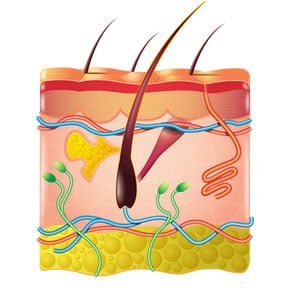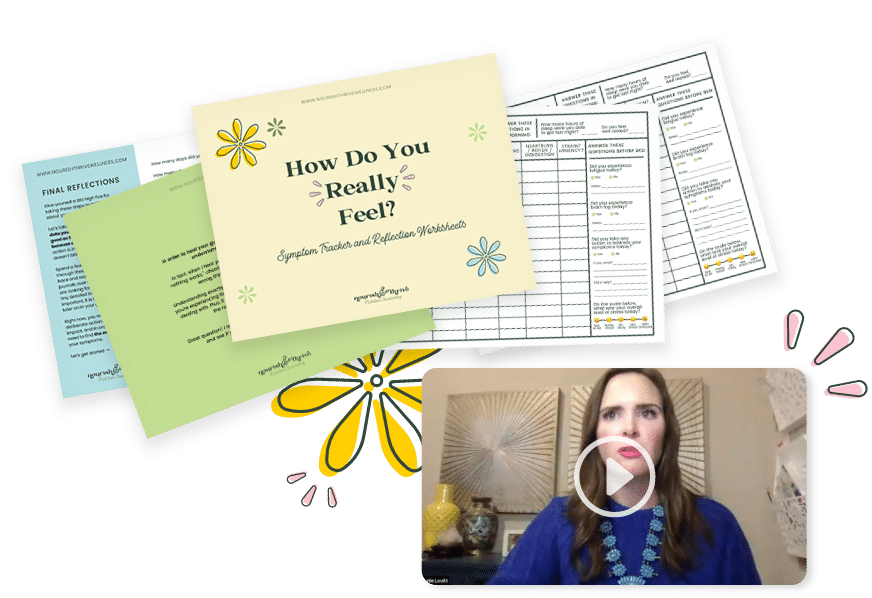Hello! I hope you all are doing well and living your most vibrant lives. As a registered dietitian, you know my biggest focus with my 1:1 clients is nutrition + hydration — what goes *in* our bodies. BUT, if you’ve been following me for very long, you know that I truly take a whole-body total nutrition approach. I don’t only talk about what goes into our bodies – I talk about what we remove from our bodies, what we hold onto that needs to be let go of, and also what goes *on* our bodies. In fact, I call this approach my 6 slices to whole body health – I’m going to go into greater detail on all 6 slices another day, but today we are going to focus on skin.

Your skin is incredible. It is your second largest organ (I bet you thought I was going to say it’s the largest organ – it’s actually taken a step down, and the microbiome is now considered to be the largest organ in the human body!); your skin is exposed to heat and cold and pollution and allergens and water – much like your gut, it shields your body, and also allows nutrients and chemicals into your body from the external environment. You probably know that it is through your skin where you absorb the super important Vitamin D. You may read elsewhere that you absorb a certain % of what you put on your skin, and within a certain amount of time – however, I am not going to commit to those statistics, because as with everything about our bodies – it’s complicated, and it all depends on many factors. Here are a few of those factors:
- Amount applied
- Amount of your body that is covered
- Location of your body that is covered
- Frequency of application
- Integrity of the skin (is it broken/inflamed)
In addition to considering how much of a product is absorbed into your body and picked up by your bloodstream and lymphatic system, we also have to consider your general health – how many other chemicals are in your bloodstream? How healthy and efficient is your liver at detoxifying those chemicals, and how effective is your gut at removing the waste?
While there is no way that I could possibly answer all of those questions for you, especially through this blog post, science does tell us that the exposure to humans in our modern world is quite high, and that these chemical exposures can have an additive effect. Just because a chemical tested in isolation was shown to not cause cancer, there was most likely no investigation of the effects from multiple chemicals interacting together in the body, or accumulating from multiple products or exposures over time. Additionally, personal care products are very loosely regulated, so the quality of the products and ingredients can vary widely.
Therefore, I strongly believe that in the interest of your whole body health, it is best to reduce chemical exposure where you are able to. We cannot control everything – but we can control some things. And what we put on our skin is something that we can control.
What’s my solution and recommendation to my friends, family, and 1:1 clients? To reduce exposure to toxic chemicals in their personal care products. But where do you even begin with this? If you start going down that rabbit hole, it can get really overwhelming – quickly. I most often recommend two resources.
- The Environmental Working Group has a database of over 70,000 ingredients called Skin Deep. In this database, they assess and rank ingredients based on a strict set of criteria. The upside is that the standards are very rigorous. The downside, is that because it is a third party, the sourcing of ingredients isn’t always considered, and can therefore sometimes lend skewed results. To check out the EWG’s Skin Deep Database, click here.
- To simplify your personal care routine, I recommend that you rely heavily on brands that you can trust. My favorite brand is Beautycounter. They are by far the leader in this space, with over 1800 questionable or harmful ingredients banned from their products. Beautycounter is not only on a mission to sell products, but they are on a mission to get safer products into the hands of everyone by advocating for updated regulations, formulating safe yet effective products, and educating people on this issue. To aid in educating consumers, Beautycounter has developed what they call The Never List – a list of all the ingredients they vow to never use in their products, with explanations of why they believe these ingredients to be harmful to human health. A great first step toward reducing your chemical exposure through personal care products is to take a look at this list and compare it to the ingredients of some of your products in your home. Click here to view and download The Never List.
I believe so strongly in the importance of this issue, that I have actually aligned myself with Beautycounter and become a consultant for them. I would love to share more about their work and help to make recommendations on where to start with cleaning up your personal care products. In fact, I am offering you the gift of my time – a FREE 15 minute consult with me to assess what products you are currently putting on your skin, and your best first steps toward cleaner personal care. Schedule that call here – I look forward to talking with you soon!
I would love to share more with you about Beautycounter’s work and their mission to get safer products into consumers’ hands. Watch this short video to hear more!
In Health,
Katie


